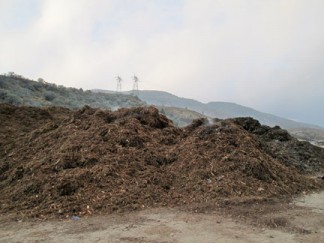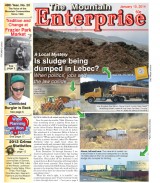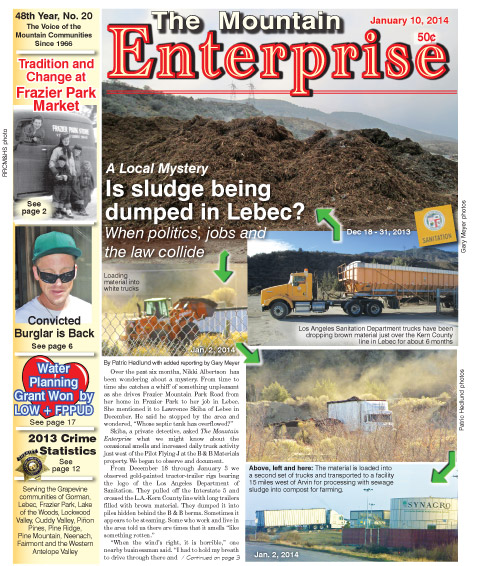When politics, jobs and the law collide
Over the past six months, Nikki Albertson has been wondering about a mystery. From time to time she catches a whiff of something unpleasant as she drives Frazier Mountain Park Road from her home in Frazier Park to her job in Lebec. She mentioned it to Lawrence Skiba of Lebec in December. He said he stopped by the area and wondered, “Whose septic tank has overflowed?”
Skiba, a private detective, asked The Mountain Enterprise what we might know about the occasional smells and increased daily truck activity just west of the Pilot Flying J at the B & B Materials property. We began to observe and document.
From December 18 through January 3 we observed gold-painted tractor-trailer rigs bearing the logo of the Los Angeles Department of Sanitation. They pulled off the Interstate 5 and crossed the L.A.-Kern County line with long trailers filled with brown material. They dumped it into piles hidden behind the B & B berms. Sometimes it appears to be steaming. Some who work and live in the area told us there are times that it smells “like something rotten.”
“When the wind’s right, it is horrible,” one nearby businessman said. “I had to hold my breath to drive through there and then I had to air my truck out when I got home.”
At other times there is little noticeable odor. The smell is just frequent enough to raise questions. There are no signs at the yard telling what is taking place, or providing a number to call if concerns arise.
A nearby resident said a dozen or more truckloads are transported daily, with the brown substance loaded onto long white trucks and removed. The cycle occurs over and again.
Journalists investigate
See a follow-up story published September 5, 2014
The Mountain Enterprise observed off and on for six days, then, on Monday, Dec. 23 made a confidential inquiry to Supervisor David Couch about what kind of permits had been pulled for activity at the Lebec facility. Couch and his staff said they would keep our inquiry private and secure the answers to our questions.
On Tuesday, Dec. 31 the sheriff was called by a Lebec business because three trucks were seen lurking in the area for hours. The reporting party was concerned. Sheriff’s deputies responded and The Mountain Enterprise contacted the sheriff to ask about the situation. The “lurkers” were said to be from the Kern County Department of Environmental Health.
On Thursday, Jan. 2, drivers of the long white trucks (said to be owned by Gonzalez Trucking) called GoVia Transport & Logistics, LLC (pronounced Go-veeya) who is their customer.
They said they were being followed. That was true. The Mountain Enterprise decided to see where they were transporting the materials.
Two reporters followed two big-rigs down the Grapevine, then about 30 miles on Interstate 5 and along back roads from Lebec to a processing facility about 15 miles west of Arvin.
Meet the world of ‘biosolids’
From outside the gates of the South Kern Compost Manufacturing Facility on Santiago Road, this reporter (Patric Hedlund) called the company and asked to speak with the manager. I was invited inside where I interviewed Synagro plant manager Tony Cordova about their operation.
Cordova was cordial, helpful and proud of the facility, saying there are others like it throughout 36 states. The company mixes sewage sludge “biosolids” from municipal wastewater processing plants with green waste in a composting process, “to remove the pathogens.” Then the compost is sold to corporate agriculture operations in the region. He gave us the annual report for Synagro.
‘Biosolids’ and ‘sludge’ are synonyms for processed sewage.
When I left, Cordova called the contractor for the trucks we had followed. GoVia Transport owner Gabriel “Gabe” Mejia called The Mountain Enterprise office immediately.
Free market and green waste
“I’m a young business guy and I’m concerned that the jobs of my drivers are at risk,” he said, adding that they live in Bakersfield and he is based in Orange County. He said he is supplying clean Los Angeles green waste to the Kern County compost facility, “as a kind of sponge” for Synagro’s compost mix made with biosolids.
“I believe in the free market,” Mejia said. “It is a complex business and I have to find the supply of materials, so different wood chips come from different places. The reason that steam is sometimes visible is because the mulched green waste from Los Angeles is at 60-70 degrees, much warmer than the, say, 40 degree air temperature in Lebec. When it is unloaded you can see the steam, but once it is adjusted to the change in temperature, you don’t.”
Mejia repeated several times that his company is recycling green waste, not sludge. He offered to let us get a sample for a lab test to confirm that. He is concerned about his competitors learning too much about his operation: “Everyone lost their jobs two years ago and we are just starting to recover a little. You know how bad the economy has been. Now we’re just starting to get back on our feet. I hope nothing will happen to put us out of business,” he said.
Mejia told us he believes the Lebec property owner has all the necessary permits. “We’re a law-abiding business. We follow the rules. We pay our taxes and pay our employees legally….”
We arranged to meet Mejia in person the next day.
In the meantime we talked with Dave Blomgren, owner of the B & B Materials property who has been renting the land to GoVia Transport for six months. The area is a former gravel mine, which several years ago reached the excavation limit allowed under B & B’s mining permit.
Blomgren said he believes his tenant has the necessary permits for the current use, “and if not, he can get them…they are not processing anything there. They are literally transferring green waste like mulch from one truck to another. I believe that is legal with my zoning.
“We are not hiding anything. I have M-1 zoning and a permit to recycle concrete and asphalt. It didn’t dawn on me that there would be any problem with this use. But if you look at it objectively, from the county’s point of view, they would have to verify that it is not something hazardous or illegal,” Blomgren added.
On Friday, Jan. 4 we asked Matthew Constantine, director of Kern County’s Department of Public Health Services about the permits that might be required for the current activity. Constantine refused to comment: “You should talk with Supervisor Couch,” he said several times. We learned that Couch was preparing to issue a press release within hours.
That same day, Gabriel Mejia drove up from Orange County to speak with Kern County officials about his transshipments. He says he was told there is an open investigation and there would be no press releases issued from Kern County.
From another source we learned that the county estimated there are about 100 tons of material at the Lebec site. “If this information is accurate, they are operating as an illegal transfer station that will need [Kern County] Environmental Health approval and permitting and may likely need land use approval,” the county source said.
Countdown to a press release
As GoVia Transport’s Gabe Mejia was leaving the Kern County meeting room in Bakersfield Friday, Jan. 3, Supervisor Couch’s staff was preparing their press announcement—just what Mejia said he was told would not occur.
Mejia pulled into Lebec for his meeting with The Mountain Enterprise at 5:30 p.m. At 5:31, as we were shaking hands, the press release Mejia said he was assured did not exist was sent out. It was titled: “Dumping of Material in Kern County by City of Los Angeles Sanitation Department.”
The release said that on Tuesday, Jan. 7 Couch would ask County Code Compliance, Planning Department and Public Health Department staff “to provide a full report to the Board of Supervisors later this month on their findings and any recommended enforcement actions which should be considered if land-use or other violations are confirmed.” To an experienced business person’s eye, that list of regulatory actions could be summarized with one word: expensive.
Then the statement took aim at a further target: “…[T]he City of Los Angeles apparently did not review regulations and requirements with local officials prior to commencing this activity…. In light of ongoing litigation with the City of Los Angeles regarding Measure E, a more open and cooperative approach would be far better.
“Instead, the activity was reported to Mr. Couch’s staff by concerned Mountain Communities citizens…. This questionable activity leads to more questions. What is this material? Why is it being handled so secretly? How long has this been occurring? I don’t have answers to these questions yet, but I intend to find out.”
Who is GoVia Transport?
In person, in the interview that evening, Gabriel Mejia appeared to be a candid young man, 32 years old. He said he was a cross-country runner in high school who graduated in 1999 and worked hard to get an education to become an electrical engineer.
Mejia said that he managed a compost facility in Orange County named Placentia Recycling from 2010 through 2012. “That is where I learned about the business,” he said. But last year Caltrans bought the land used by the recycling operation, so Mejia started GoVia Transport & Logistics, LLC.
He knew that compost facilities need clean material to mix with “biosolids” and he knew where to source the green waste. He already had the business relationships. Mejia said again that the material his company is shipping is “99.9% green waste, like shrubbery.”
He said that the Los Angeles Sanitation Department must meet high standards of scrutiny for the purity of their green waste product, enforced by their own “LEA”—local enforcement agency—in L.A. County.
Mejia said his original partner called Kern County to ask about what is needed to transship green waste between counties and was assured that nothing was needed. We asked to speak with that former partner.
“Never in my wildest dreams did I think I would be meeting with six or seven government people and a newspaper today. I’m just a little company in Lebec,” he said, adding that he hopes there will be an amicable agreement with Kern County. “We didn’t think we needed a [special] permit. Our next step is to cooperate with anything they want because we think we are compliant.”
Mejia is apprehensive about the motive for making a major press release about his operation: “Nobody wants to have their names slandered by the government. I don’t want a black mark on my character, because I want to continue doing business in this area.”
He said he understands that readers of The Mountain Enterprise want to know if the material is sludge. “They want to know what this is,” and agreed again to a lab analysis.
But he is also concerned that politics may be in play. He said that the industry is filled with big players who work with politicians to try to keep small businesses out of recycling.
“If they ask me to get a waste handling permit like the [Community Recycling and Resource Recovery] plant has in [Lamont and] Arvin, that is a $5 million permit. I can’t get a business loan to cover that kind of expense. We are a small company transporting mulch and wood chips. They would just put us out of business.”
We asked if there is a sliding scale approach to permits, based on the revenue of the operation.
“Typically, the permits are the same price for little companies as for big ones,” Mejia said. “That makes a barrier, keeping the cost of entry into the market too high for small businesses.”
Slow-motion biosolids brawl
For at least eight years, Kern County’s government and residents have been touchy about being the unwilling recipients of Los Angeles sludge and other waste products. A long legal brawl has been playing out in slow motion since 2006. The battle continues.
Everyone in America whose home has indoor plumbing connected to a municipal sewage system is a producer of “biosolids.” In the prettied-up language of those faced with finding a way to dispose of the stuff left over from sewage treatment plants, it is “a renewable resource.” That is putting it mildly.
Hundreds of millions of tons of processed human waste are produced each year by every major city in the country. What to do with the residue is a major, growing problem.
When Los Angeles looked around about 25 years ago, the San Joaquin Valley’s expansive stretch of “bread basket” agricultural lands kindled visions of a possible solution. L.A. waste treatment engineers reasoned that biosolids could be seen as a benefit to agriculture, like the honey buckets used in the rice paddies of rural China.
By 2006, one third of all California’s sewage sludge was being trucked to Kern County. In 2000, L.A. opened ‘Green Acres,’ a 4,688-acre Kern County facility for dumping 750 tons of sewage biosolids each day.
But now there is a hitch. Scientists have discovered that a Chinese honey bucket was a lot purer than what is now in America’s municipal biosolids. Researchers are asking what impact residues from pharmaceutical medicines widely used by the U.S. population might have on ground water and on food being grown in the biosolid substrate.
A variety of hormones, antibiotics and psychotropic medications have been found in biosolids, plus industrial wastes, cancer-causing PCBs and metals that collect in the tissues of the human body. These can all have a cumulative negative impact on public health.
In 2006, an initiative called Measure E was put on the ballot in Kern County to stop Los Angeles from using county lands for dumping biosolids. The measure succeeded. Voters rejected allowing more sewage to be dumped in their backyards. But the story didn’t end there.
L.A. took Kern County to court, and they won. A judge said Kern County has to continue taking biosolids from the city. Of course Kern County appealed the ruling. And the volley of lawsuits and appeals has continued for eight years.
Young Gabriel Mejia and his employees have stumbled into the middle of this fire fight. It appears the supervisor’s office has seized the opportunity to show L.A. they are vigilant.
Los Angeles Sanitation
Our investigation at the Los Angeles Bureau of Sanitation yielded a confirmation, despite an initial denial, that the trucks are theirs. They are coming from the Lopez Canyon Environmental Center (in the northern San Fernando Valley) and Harbor Green Processing Facility (near San Pedro).
Spokesperson Cora Jackson said the trucks are carrying “a mixture of clean curbside-collected yard trimmings and tree brush.” She said their workers “clean through it, taking all the non-recyclable items out of there. We deliver mulch to this location in Lebec sometimes up to five loads a day. The material we deliver doesn’t include any sewage by-product in it.”
Jackson said the Los Angeles Local Enforcement Agency oversees the operation at their facilities and the content of green waste that is trucked out of the city: “Periodically, we receive inquiries from LEA’s having jurisdictions over areas where we deliver the material to,” Jackson replied.
We still need to know what caused that odor. The Mountain Enterprise will continue efforts to secure an analysis of the material in Lebec.
See the follow-up report and proposed fine to the City of Los Angeles, September 2014
Photo captions:
Loading material into white trucks
The material is loaded into a second set of trucks and transported to a facility 15 miles west of Arvin for processing with sewage sludge into compost for farming.
Questions are being raised about a mysterious new trans-shipping operation at B & B Materials in Lebec, from which a foul odor is sometimes detectable, neighbors say.
County Supervisor David Couch (far right) stopped by the office of The Mountain Enterprise with staffers (l-r) Ryan Shultz, David Brust and Alan Christensen on December 23 for a talk, including our question about the Lebec operation.
To see full stories with photos, please go to The Mountain Enterprise e-Edition
(login required)
You can have your newspaper delivered via mail! Just call 661-245-3794.
Also, this story and others are available right now at newsstands throughout the Mountain Communities.
This is part of the January 10, 2014 online edition of The Mountain Enterprise.
Have an opinion on this matter? We'd like to hear from you.

![Los Angeles Sanitation Department trucks have been dropping brown material just over the Kern County line in Lebec for about 6 months. [photo by Gary Meyer]](https://mountainenterprise.com/wp-content/uploads/IMG_0589_w-324x243.jpg)


